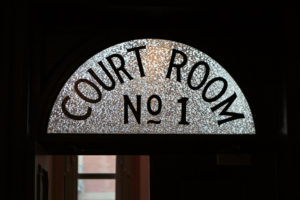By: Hailey Cleek & Mike Garrigan
In 2014, David E. Abbott, a detective with the Manassas City Police Department in Virginia, investigated allegations that seventeen-year-old Trey Sims used his cell phone to send sexually explicit photographs and video recordings of himself to his fifteen-year-old girlfriend.[1] Detective Abbott obtained a search warrant authorizing photography of Sims’ naked body, including his erect penis. When Abbott executed the warrant, he allegedly demanded that Sims manipulate his penis to achieve an erection. Sims unsuccessfully attempted to comply with Abbott’s order. Detective Abbott died before the present case was filed. Sims therefore initiated this action against Kenneth Labowitz, the administrator of Abbott’s estate.
Suspect Sims brought a 42 U.S.C. § 1983 action[2] against the administrator of Detective Abbott’s estate, alleging that this search violated his Fourth Amendment right of privacy and that, as result of search, he was victim of manufactured child pornography. Traditionally, public officials are granted either absolute or qualified immunity from lawsuits when performing their official duties.[3] Qualified immunity is generally extended to police officers or other officials. Yet, actions taken by these officials with a “deliberate indifference” may impose liability.[4] The district court determined that the administrator was entitled to qualified immunity on the § 1983 claims. The Fourth Circuit heard arguments on whether a reasonable police officer would have known that attempting to obtain a photograph of a minor child’s erect penis, by ordering the child to masturbate in the presence of others, would unlawfully invade the child’s right of privacy under the Fourth Amendment.
Plaintiff’s Arguments
Plaintiff argued that while the Fourth Amendment does at times protect sexually invasive searches, Detective Abbott clearly violated personal privacy rights. In examining sexually invasive searches under the Fourth Amendment, courts balance “the invasion of personal rights caused by the search against the need for that particular search.”[5] Factors to determine this balance are: (1) the scope of the particular intrusion; (2) the manner in which the search was conducted; (3) the justification for initiating the search; and (4) the place in which the search was performed.[6] Courts have described such sexually invasive searches, including strip searches, as humiliating and demeaning.[7] In King v. Rubenstein,[8] the Fourth Circuit previously held that sexually invasive searches relate to deep “interest[s] of bodily integrity,” which “involves the most personal and deep-rooted expectations of privacy.”[9]
Using these factors, Plaintiff-Appellant Sims illustrated the severe Fourth Amendment violations by Detective Abbott. Although Detective Abbott sought to obtain photographs of Sims’ erect penis for an evidentiary purpose, the Commonwealth ultimately agreed not to use the photographs of Sims’ body as evidence.[10] There was no need to take these photographs. Instead, Detective Abbot executed the search warrant by ordering teenager Sims to masturbate to obtain an erection in the presence of three armed officers.[11] Such alleged conduct would necessarily invade Sims’ bodily integrity, regardless if Sims’ body was not penetrated or physically harmed.[12] Plaintiff was humiliated throughout the reckless disregard of his bodily privacy; he deferred applying for college, despite his outstanding academic and extracurricular records.[13] Throughout the investigation and prosecution, he was mortified to face his peers.[14]
Plaintiff strongly asserted that Detective Abbott was not entitled to qualified immunity. Qualified immunity only protects public officials from constitutional violations when resulting from “reasonable mistakes.”[15] It does not protect “the plainly incompetent or those who knowingly violate the law.”[16] A Virginia police detective is properly charged with knowledge of laws criminalizing the creation of child pornography.[17] There is no exception for police officers. While there were fortunately no other related cases on point to illustrate a lack of exception, the Fourth Circuit has previously held that some facts of abuse are so clear that they do not require case law justification.[18] Beyond a passive excuse of following orders, Detective Abbott had no reason to believe that this search was reasonable. Yet, even with a warrant, Detective Abbott was not bound to seek or execute a plainly unconstitutional warrant.[19] The request of a prosecutor for a search is not nullifying to the responsibility to act reasonably. An officer cannot receive the protections of qualified immunity when asking a teenager to masturbate in front of three armed guards.
Defense’s Arguments
Labowitz asserted that Sims failed to state enough facts to support a Fourth Amendment violation.[20] Here, Labowitz argued that Abbott’s search neither placed Sims at risk of bodily harm nor physically invaded Sims’ body,[21] and therefore fell outside of Fourth Amendment protection. The defense used four arguments to assert that this search fell outside of Fourth Amendment protection. First, Labowitz cited several cases where valid search warrants were issued in similar circumstances–namely involving identifying scars, moles, and/or tattoos on a suspect’s genitalia.[22] Second, Labowitz observed that Abbott took no action that aimed to bring about an erection by Sims.[23] Third, Labowitz cited multiple cases that validate warrantless custodial strip searches of juveniles.[24] Finally, Labowitz argued that a photograph is not invasive, but even if it were, case law supports warrantless searches of a defendant’s physical person in certain circumstances.[25]
Labowtiz also argued that the district court properly recognized Abbott’s immunity. Qualified immunity protects government officials from civil liability as long as their conduct does not “violate clearly established statutory or constitutional rights of which a reasonable person would have known.”[26] Here, the key question was whether Abbott “acted as an objectively reasonable police officer would have acted under similar circumstances.”[27] Labowitz offered three reasons why Abbott behaved as a reasonable police officer.[28] First, a reasonable officer would rely on a warrant an attorney directed him to seek. Second, a reasonable officer would conclude that strip search conducted at a detention center under a warrant is appropriate. Third, no reasonable officer would have thought that he was producing child pornography when acting under a search warrant.
Sexually Intrusive Search Jurisprudence Addresses Questions for Immunity
While the majority for the Fourth Circuit strongly condemned Detective Abbott’s actions and held that such alleged conduct necessarily invaded Sims’ bodily integrity and privacy rights,[29] Judge King, in a dissenting opinion, notes that the case raises distinct questions for qualified immunity.[30] He notes that Detective Abbott was acting pursuant to the advice of counsel and adhering to a court order.[31] It is a foundational rule to the legal system and independent judiciary that court orders should be respected, complied with, and obeyed among law enforcement officers.[32] Court orders ensure compliance with the rule of law in society, and public officials are bound by both the cultural and institutional weight afforded to judge’s decisions.[33] When a judicial officer, Judge King suggests, has issued a search warrant upon probable cause, it is “unreasonable to require the officer charged with executing the warrant to reject the judicial decision and disobey the court’s directive.”[34] Generally, citizens want officers to comply and follow court orders in respect for the rule of law
Although the rule of law encourages officers to comply with and follow warrants accordingly, an entire body of sexual search jurisprudence has emerged to establish limits on sexually invasive searches. In Illinois v. Lafayette,[35] the Supreme Court held that an officer cannot disrobe an arrestee publicly without justifying factors. In United States v. Edwards,[36] the Fourth Circuit held that an officer’s sexually invasive search was unlawful because the dangerous manner in which he removed the contraband outweighed the interest in retrieving contraband. Likewise, in Amaechi v. West,[37] the Fourth Circuit found no justification for an officer’s pat-down search to include touching arrestee’s buttocks and penetrating her exposed genitalia. While these cases involved warrantless searches, they highlight the plainly unreasonable nature of the present case, as sexually invasive searches generally only happen in exigent circumstances.[38] Officers are encouraged to follow the boundaries of the search warrant, yet citizens cannot be expected to tolerate an officer acting beyond the guided parameters of sexual search warrants. Here, the warrant did not authorize Abbott’s conduct of requiring Sims to masturbate in the presence of the officers.[39] There was neither an evidentiary justification nor valid reason to demand Sims to masturbate in the presence of others.[40]
Conclusion
A little over a month after the Fourth Circuit heard Sims v. Labowitz, the Children’s Justice Fund (“CJF”), a nonprofit organization dedicated to aiding victims of child sex abuse, filed an amicus brief in support of a rehearing.[41] CJF argued that the Fourth Circuit panel erred by defining “sexually explicit conduct” in a way that could have “potentially profound implications for this case and future plaintiff victims.”[42] The Court, CJF argued, eschewed four objective terms for a subjective term. “Sexual intercourse,” “bestiality,” “masturbation,” and “sadistic or masochistic abuse” are more or less objective while “lascivious exhibition of the genitals or pubic area” relies on subjective “Dost factors.”[43] CJF contended that masturbation is per se explicit conduct under 18 U.S.C. § 2256(2)(A) and bringing Dost factors into the analysis was “unnecessary and unwarranted.”[44]
On March 14, 2018, the Fourth Circuit granted the motion for rehearing. While the rehearing will likely only correct the definitional scope of “sexually explicit conduct,” Sims reinforces the limits of police immunity. Moving forward, public officials in Maryland, South Carolina, North Carolina, West Virginia, and Virginia are officially on notice that such unreasonable sexual search conduct is not permissible. In line with previous sexual search jurisprudence, the Fourth Circuit has reaffirmed the bodily integrity of individuals.
[1] Sims v. Labowitz, 877 F.3d 171 (4th Cir. 2017).
[2] This refers to lawsuits brought under Section 1983 of Title 42 of the United States Code. See 42 U.S.C. § 1983. Section 1983 provides an individual the right to sue state government employees and others acting “under color of state law” for civil rights violations.
[3] Janell M. Byrd, Rejecting Absolute Immunity for Federal Officials, 71 Cal. L. Rev. 1707, 1713 (1983).
[4] See Farmer v. Brennan, 511 U.S. 825, 843 (1994).
[5] Bell v. Wolfish, 441 U.S. 520, 559 (1979).
[6] Id.
[7] See, e.g., Mary Beth v. City of Chicago, 723 F.2d 1263, 1272 (7th Cir. 1983).
[8] 825 F.3d 206 (4th Cir. 2016).
[9] Id. at 215.
[10] Brief for Appellant at 10–11, Sims v. Labowitz, 877 F.3d 171 (2017) (No. 16-2174).
[11] Id. at 8.
[12] Id. at 38 (“Manifestly, this amounts to ‘state intrusion[] into realms of personal privacy and bodily security through means so brutal, demeaning, and harmful as literally to shock the conscience of a court.’”)(quoting Hall v. Tawney, 621 F.2d 607, 613 (4th Cir. 1980)).
[13] Id. at 12.
[14] Id.
[15] Saucier v. Katz, 533 U.S. 194, 206 (2001).
[16] Malley v. Briggs, 475 U.S. 335, 341 (1986).
[17] Brief for Appellant at 36, Sims v. Labowitz, 877 F.3d 171 (2017) (No. 16-2174).
[18] Clem v. Corbeau, 284 F.3d 543, 553 (4th Cir. 2002) (“[W]hen the defendants’ conduct is so patently violative of the constitutional right that reasonable officials would know without guidance . . . closely analogous pre-existing case law is not required to show the law is clearly established.”).
[19] See Graham v. Gagnon, 831 F.3d 176, 183 (4th Cir. 2016)(“I]f no officer of reasonable competence would have requested the warrant… [t]he officer then cannot excuse his own default by pointing to the greater incompetence of the magistrate.”).
[20] Sims v. Labowitz, 877 F.3d 171, 177 (4th Cir. 2017).
[21] Id.
[22] Response Brief for Appellee at 10, Sims v. Labowitz, 877 F.3d 171 (2017) (No. 16-2174).
[23] Id. at 11.
[24] Id. at 12.
[25] Id. at 13.
[26] Harlow v. Fitzgerald, 457 U.S. 800 (1982).
[27] Defendant Estate of David Abbott’s Memoradum in Support of Motion to Dismiss Second Amended Complaint at 17, Sims v. Labowitz, 877 F.3d 171 (2017) (No. 16-2174).
[28] Response Brief for Appellee at 30, Sims v. Labowitz, 877 F.3d 171 (2017) (No. 16-2174).
[29] Sims v. Labowitz, 877 F.3d 171, 178 (4th Cir. 2017).
[30] Id. at 183 (J. King, dissenting).
[31] Id.
[32] Id.
[33] See Stephen G. Breyer, Judicial Independence in the United States, 40 St. Louis U. L.J. 989, 994-96 (1996)
[34] Sims v. Labowitz, 877 F.3d 171, 184 (4th Cir. 2017) (J. King, dissenting).
[35] 462 U.S. 640 (1983).
[36] 666 F.3d 877 (4th Cir. 2011).
[37] 237 F.3d 356 (4th Cir. 2001).
[38] Sims v. Labowitz, 877 F.3d 171, 182 (4th Cir. 2017).
[39] Id. at 182, n. 3.
[40] Id. at 180.
[41] Under Federal Rule of Appellate Procedure 27(b)(2), “[t]he United States or its officer or agency or a state may file an amicus-curiae brief without the consent of the parties or leave of court. Any other amicus curiae may file a brief only by leave of court.”
[42] Amicus Brief of the Children’s Justice Fund and Child USA in Support of the Plaintiff-Appellant Trey Sims at *4, Sims v. Labowitz, 877 F.3d 171 (2017) (No. 16-2174).
[43] Id. at *3.
[44] Id. at *8.









